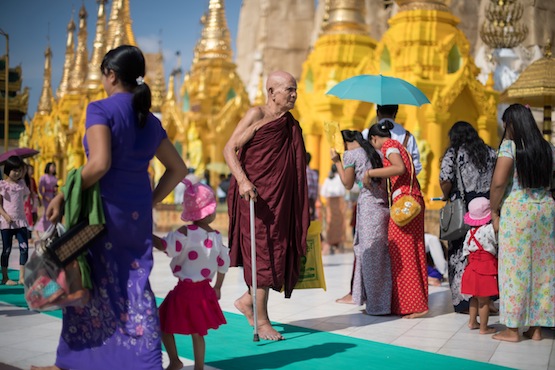Buddhists walk the middle path on Pope's visit
While Catholics have rejoiced at the first papal trip to Myanmar, most Buddhists remain cautious over what he will say about the Rohingya crisis
Nov 29, 2017

YANGON: While thousands of Catholics are excited by Pope Francis' first visit to Myanmar, feelings amongst the nation's Buddhists are decidedly mixed.
The news of the pope's visit has already drawn the ire of hardline Buddhist groups who have fanned recent sectarian violence and protests, especially against the Rohingya and other Muslims over the past five years.
In Myanmar, Catholics number 700,000 and are a minority in the predominately Buddhist country where 90 percent of the population follows Theravada Buddhism.
Whether Pope Francis will use the politically-charged term 'Rohingya,' which Myanmar authorities do not recognize as they see them as outsiders, triggered great speculation prior to his visit.
More than 620,000 Muslim Rohingya have fled from northern Rakhine state over the past four months following a military crackdown, fueled in part by Buddhist hardliners.
Buddhists such as Soe Naing, from Sittwe, the capital city of Rakhine State, said they welcome the pope as a Catholic and global leader advocating peace.
But he added fellow Buddhists were concerned that Pope Francis would use the term Rohingya and talk about the "Rakhine crisis," as he doesn't know about the situation on the ground.
"If he (the pope) uses the 'R' word, it may be a political incitement so it is better not to use it," Soe Naing said.
Buddhist Nan Si Phone, vice president of the Yangon-based NGO the Rattana Metta Organization, is excited about the pope's visit and welcomed solidarity with minority Catholics.
The 69-year-old ethnic Shan woman is not unfamiliar with Catholicism as she studied at a church-run mission school from 1955-1965.
"We received a quality education, and learned discipline and good habits thanks to the missionary nuns and we learned about their charity works," Nan Si Phone said.
For her, the pope's visit is very significant and she believes the pontiff will focus on ending decades-long civil wars that still rage in ethnic areas.
She realizes that the country is reeling from not only civil wars, but also the Rohingya crisis which has gained the world's attention.
"In my opinion, when the pope talks about peace and civil wars they need to be a separate thing from the Rakhine crisis as those two issues shouldn't be combined," said Nan Si Phone.
She said she had no problem with the pope using the term Rohingya as it was up to him. "We have no right to tell him over the use," she said.
Yangon taxi driver Ko Soe, said he has no issue with the pope visiting his Buddhist-majority country as other leaders had already done so.
"But the people will have concerns if leaders from Muslim countries visit our country," Ko Soe said.
He added there were good relations among the Buddhist, Muslim and Christian communities, especially in the cities. But mistrust increased when the Rakhine crisis erupted in western Myanmar.
In an indication of local Buddhists' sentiments Ko Soe refers to the "Rakhine" crisis and the "Bengalis" fleeing to Bangladesh instead of using the term Rogingya. He talks of links between the "Bengali" and the militant Arakan Rohingya Salvation Army, which the Myanmar military blames for stoking their response to attacks on security outposts.
"Thousands of people have entered into Rakhine illegally from neighboring Bangladesh so they are not the citizens of Myanmar," Ko Soe said.
Nan Si Phone said she didn't hear the word Rohingya before 2012 and prior to that they were simply referred to as Muslims in Rakhine State.
However, she added there was unlikely to be protests against the pope even if he used the 'R' word as Buddhists had no prejudice against Christians.--Ucanews.Com







Total Comments:0